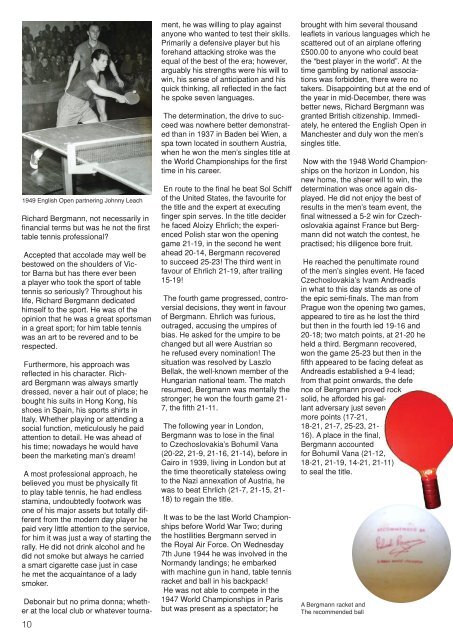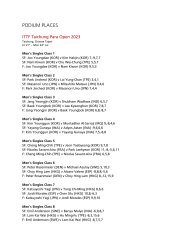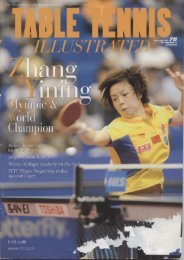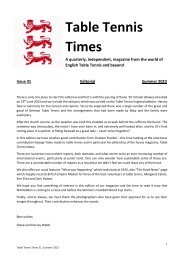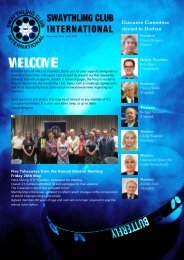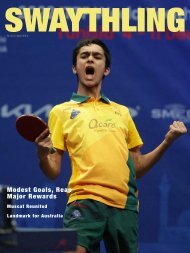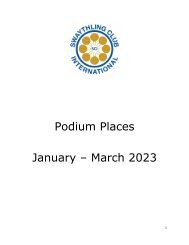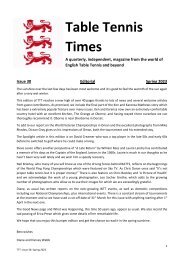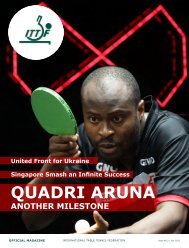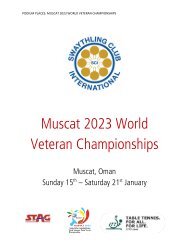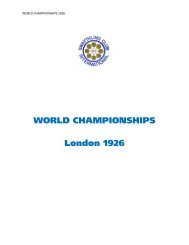Create successful ePaper yourself
Turn your PDF publications into a flip-book with our unique Google optimized e-Paper software.
1949 English Open partnering Johnny Leach<br />
Richard Bergmann, not necessarily in<br />
financial terms but was he not the first<br />
table tennis professional?<br />
Accepted that accolade may well be<br />
bestowed on the shoulders of Victor<br />
Barna but has there ever been<br />
a player who took the sport of table<br />
tennis so seriously? Throughout his<br />
life, Richard Bergmann dedicated<br />
himself to the sport. He was of the<br />
opinion that he was a great sportsman<br />
in a great sport; for him table tennis<br />
was an art to be revered and to be<br />
respected.<br />
Furthermore, his approach was<br />
reflected in his character. Richard<br />
Bergmann was always smartly<br />
dressed, never a hair out of place; he<br />
bought his suits in Hong Kong, his<br />
shoes in Spain, his sports shirts in<br />
Italy. Whether playing or attending a<br />
social function, meticulously he paid<br />
attention to detail. He was ahead of<br />
his time; nowadays he would have<br />
been the marketing man’s dream!<br />
A most professional approach, he<br />
believed you must be physically fit<br />
to play table tennis, he had endless<br />
stamina, undoubtedly footwork was<br />
one of his major assets but totally different<br />
from the modern day player he<br />
paid very little attention to the service,<br />
for him it was just a way of starting the<br />
rally. He did not drink alcohol and he<br />
did not smoke but always he carried<br />
a smart cigarette case just in case<br />
he met the acquaintance of a lady<br />
smoker.<br />
10<br />
Debonair but no prima donna; whether<br />
at the local club or whatever tournament,<br />
he was willing to play against<br />
anyone who wanted to test their skills.<br />
Primarily a defensive player but his<br />
forehand attacking stroke was the<br />
equal of the best of the era; however,<br />
arguably his strengths were his will to<br />
win, his sense of anticipation and his<br />
quick thinking, all reflected in the fact<br />
he spoke seven languages.<br />
The determination, the drive to succeed<br />
was nowhere better demonstrated<br />
than in 1937 in Baden bei Wien, a<br />
spa town located in southern Austria,<br />
when he won the men’s singles title at<br />
the World Championships for the first<br />
time in his career.<br />
En route to the final he beat Sol Schiff<br />
of the United States, the favourite for<br />
the title and the expert at executing<br />
finger spin serves. In the title decider<br />
he faced Aloizy Ehrlich; the experienced<br />
Polish star won the opening<br />
game 21-19, in the second he went<br />
ahead 20-14, Bergmann recovered<br />
to succeed 25-23! The third went in<br />
favour of Ehrlich 21-19, after trailing<br />
15-19!<br />
The fourth game progressed, controversial<br />
decisions, they went in favour<br />
of Bergmann. Ehrlich was furious,<br />
outraged, accusing the umpires of<br />
bias. He asked for the umpire to be<br />
changed but all were Austrian so<br />
he refused every nomination! The<br />
situation was resolved by Laszlo<br />
Bellak, the well-known member of the<br />
Hungarian national team. The match<br />
resumed, Bergmann was mentally the<br />
stronger; he won the fourth game 21-<br />
7, the fifth 21-11.<br />
The following year in London,<br />
Bergmann was to lose in the final<br />
to Czechoslovakia’s Bohumil Vana<br />
(20-22, 21-9, 21-16, 21-14), before in<br />
Cairo in 1939, living in London but at<br />
the time theoretically stateless owing<br />
to the Nazi annexation of Austria, he<br />
was to beat Ehrlich (21-7, 21-15, 21-<br />
18) to regain the title.<br />
It was to be the last World Championships<br />
before World War Two; during<br />
the hostilities Bergmann served in<br />
the Royal Air Force. On Wednesday<br />
7th June 1944 he was involved in the<br />
Normandy landings; he embarked<br />
with machine gun in hand, table tennis<br />
racket and ball in his backpack!<br />
He was not able to compete in the<br />
1947 World Championships in Paris<br />
but was present as a spectator; he<br />
brought with him several thousand<br />
leaflets in various languages which he<br />
scattered out of an airplane offering<br />
£500.00 to anyone who could beat<br />
the “best player in the world”. At the<br />
time gambling by national associations<br />
was forbidden, there were no<br />
takers. Disappointing but at the end of<br />
the year in mid-December, there was<br />
better news, Richard Bergmann was<br />
granted British citizenship. Immediately,<br />
he entered the English Open in<br />
Manchester and duly won the men’s<br />
singles title.<br />
Now with the 1948 World Championships<br />
on the horizon in London, his<br />
new home, the sheer will to win, the<br />
determination was once again displayed.<br />
He did not enjoy the best of<br />
results in the men’s team event, the<br />
final witnessed a 5-2 win for Czechoslovakia<br />
against France but Bergmann<br />
did not watch the contest, he<br />
practised; his diligence bore fruit.<br />
He reached the penultimate round<br />
of the men’s singles event. He faced<br />
Czechoslovakia’s Ivam Andreadis<br />
in what to this day stands as one of<br />
the epic semi-finals. The man from<br />
Prague won the opening two games,<br />
appeared to tire as he lost the third<br />
but then in the fourth led 19-16 and<br />
20-18; two match points, at 21-20 he<br />
held a third. Bergmann recovered,<br />
won the game 25-23 but then in the<br />
fifth appeared to be facing defeat as<br />
Andreadis established a 9-4 lead;<br />
from that point onwards, the defe<br />
nce of Bergmann proved rock<br />
solid, he afforded his gallant<br />
adversary just seven<br />
more points (17-21,<br />
18-21, 21-7, 25-23, 21-<br />
16). A place in the final,<br />
Bergmann accounted<br />
for Bohumil Vana (21-12,<br />
18-21, 21-19, 14-21, 21-11)<br />
to seal the title.<br />
A Bergmann racket and<br />
The recommended ball<br />
“Return the ball any<br />
way you can but return<br />
it. Any stroke,<br />
any smash, whatever<br />
its impact<br />
can be returned if<br />
your racket catches<br />
the ball. Of course<br />
your legs must act<br />
fast in order<br />
to get you<br />
to the right<br />
position.”<br />
One year later in 1949 in Stockholm,<br />
Bergmann was to somewhat unexpectedly<br />
lose to Hungary’s Ferenc<br />
Soos in the last 16, before in 1950<br />
in Budapest avenging the defeat.<br />
He overcame Soos in the final, yet<br />
another contest that underlined his<br />
tenacity. The match started at 1.00<br />
am in the morning, both principally<br />
defenders, it was a long drawn out<br />
encounter, Soos won the opening two<br />
games, Bergmann returning the ball<br />
high, encouraging his opponent to<br />
attack, recovered to level matters. In<br />
the fifth game, Soos went ahead 8-2,<br />
at 12-all it was parity, Soos lost his<br />
temper, Bergmann surrendered just<br />
one further point; for the fourth time he<br />
was the world champion.<br />
Success in English colours but<br />
also he experienced clashes with<br />
the authorities. He was suspended<br />
after travelling to South Africa to play<br />
exhibition matches; thus he did not<br />
compete in the 1951 World Championships<br />
staged in Vienna, the country<br />
of his birth. The following year, he<br />
was involved in exhibition matches<br />
in a Paris music hall; as a result for<br />
the forthcoming 1952 World Championships<br />
in Bombay, England did not<br />
originally select Bergmann believing<br />
with justification that his form was not<br />
at the level required.<br />
However, they kept the fifth place<br />
vacant, advising that an improvement<br />
was needed and he would be required<br />
to pay his own expenses. Bergmann<br />
duly practised diligently. In the<br />
The year 1952<br />
1955 in Tokyo with Johnny Leach and Ivor Montagu<br />
Monday 13th July 1953, with Johnny Leach at the Wataya Hotel in Kumamoto<br />
11


